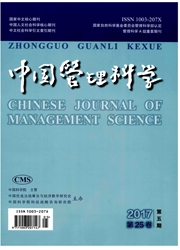

 中文摘要:
中文摘要:
在大小股东冲突框架下,基于大股东对控制权私利可持续性偏好,构建大股东获取控制权私利行为模型,研究了潜在风险对大股东获取控制权私利行为的影响及对公司价值的影响,对部分控制权私利的合理性进行了探讨。而后,利用研究结论给出一个控制权私利悖论的解释。研究表明:(1)因潜在风险(成本)的存在,大股东会谋取位于控制权私利容忍区间内的控制权私利,达到既能让自己的控制权成本得到补偿,又能维持收益的可持续性目的。(2)获取适当控制权私利对大股东具有激励作用,能够保证中小股东利益和公司价值不受到损失。(3)超额控制权私利具有侵害性质,会导致中小股东利益和公司价值受损,它才是控制与治理的对象。最后文章在理论分析的基础上给出了一些结论和建议。
 英文摘要:
英文摘要:
Based on information asymmetry, a model of pursuing private benefits of control was presented to study restraining role of potential risks. The main conclusions of the paper are as follows. First, controlling shareholder will choose a level within given interval, namely private benefits tolerance interval to compensate benefits for controlling cost and to maintain the sustainability of the benefits with restriction of potential risks. Second, rational private benefit of control will not only inspire controlling shareholder, but also protect the interests of minority shareholders and corporation value. Third, excessive private benefits of control have the nature of infringement on minority shareholders, which will reduce the benifit of minority shareholders and the value of corporation. Finally, an explanation about paradox of private benefits of control is presented, some conclusions and suggestions based on the theoretical analysis are given.
 同期刊论文项目
同期刊论文项目
 同项目期刊论文
同项目期刊论文
 期刊信息
期刊信息
